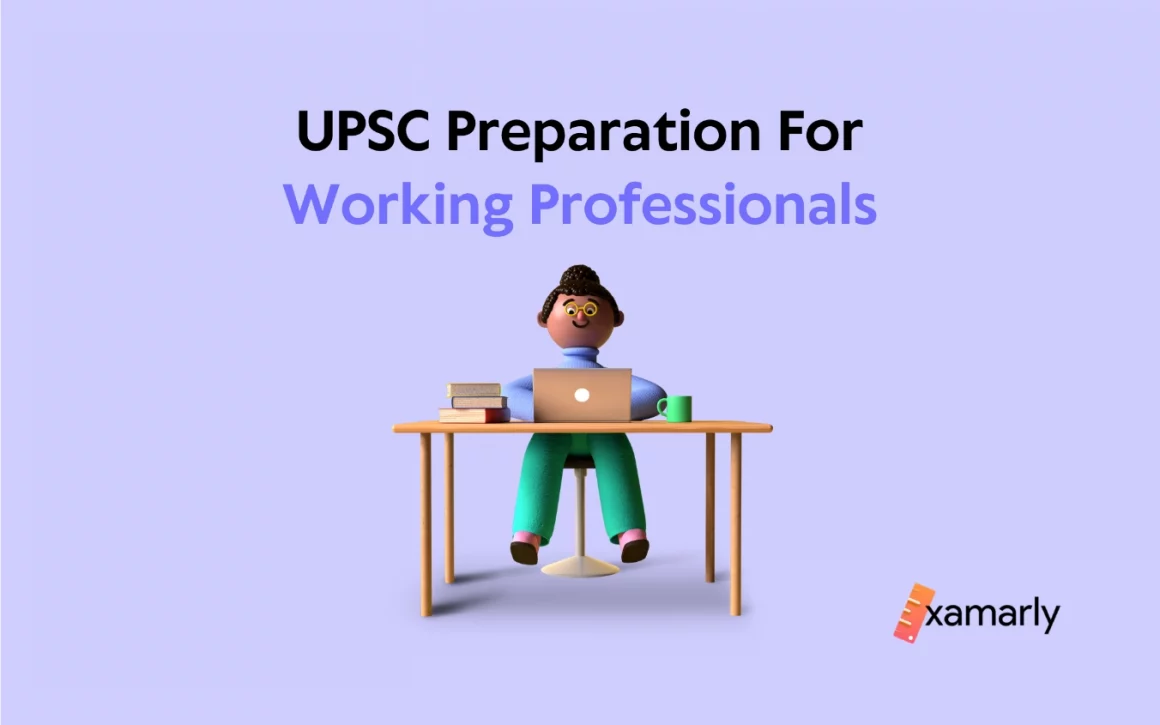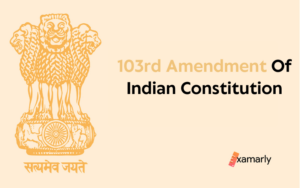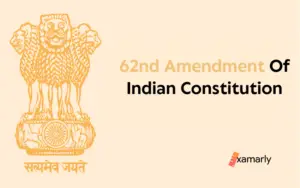“If like me, an aspirant has less time to prepare and revise, it is important to analyze the Return Of Investment that each topic under the syllabus will give you.” –Kajal Jawla, AIR-28, UPSC CSE 2018.
The UPSC Civil Services Exam is tough to clear, and it becomes even more difficult if you are attempting to do so while working full-time.
Most of the candidates who appear in the UPSC CSE feel that UPSC preparation for working professionals answer it as a hindrance to their ultimate goal of becoming an IAS officer. To be honest, it appears to be one at first glance. You can only commit 3–4 study hours a day to preparation for the UPSC civil services main test, and that too unevenly, compared to other IAS aspirants who put in a months time effort.
This is one of the most important questions encountered for UPSC preparation for working professionals as there is no dedicated time for preparation of the IAS Exam.
- Can a Working Professional Ace the UPSC?
- Benefits of UPSC Preparation for Working Professionals
- Does Study Schedule Matter while Preparing for UPSC?
- 9 Tips on How to Crack UPSC CSE while Working Full Time
- 1. Schedule Your Study Time
- 2. Set a Goal and Stick to it
- 3. Utilize Each and Every Second
- 4. Take Breaks in Between Study Sessions
- 5. Focus on Smart Work
- 6. Self Preparation for IAS with Examarly
- 7. A Selective Study Plan is One Option
- 8. Study in Blocks Instead of One Long Session
- 9. Revision is Key
- 4 Preparation Strategies for Working Professionals
- 1. Staying Close to Your Workplace
- 2. Avoid Studying at Unusual Places
- 3. Understanding the Structure of the IAS Exam and the Competition
- 4. Consider Your Job to be an Added Advantage
- Mistakes to Avoid for Working Individuals while Preparing for UPSC
- Notable People who Cleared UPSC with a Full-Time Job
- Conclusion
- FAQs on UPSC Preparation for Working Professionals
- Can working professionals clear the UPSC exam?
- How much time is required to prepare for UPSC while working full-time?
- What is the best way to prepare for UPSC while working full-time?
- Can online resources be used for UPSC preparation while working full-time?
- What are the challenges faced by working professionals while preparing for UPSC?
Can a Working Professional Ace the UPSC?
While studying for the UPSC civil service examination or any other competitive exam, working professionals must develop a well-planned preparation strategy and make rational choices. A full-time employment brings in huge time constraints for a good preparation & focused mind.
While preparing for the exam is crucial, an injudicious approach will only waste time and money. To ensure success, working professionals must make rational choices to figure out the perfect strategy/study materials that would benefit them in the long run.
It is recommended that working professionals sufficient hours of study for UPSC each day and 10-12 hours studying on Sundays.
Time management for UPSC is the major determining factor in cracking UPSC in the first attempt.
One of the most important steps in creating a strategy is to assess one’s current position. The current position of the individual will help them devise a suitable timetable. After analyzing their current situation, they can create a study plan. The working professional should know how to balance pragmatism and idealism while preparing for the Civil Service Exam.
While it may be tempting to quit your current job at the start of the preparation process, it can harm your career prospects. Your job experience does matter in UPSC as it’ll help you score more in your interviews. There have been many cases that suggest that panelists in the interview look at experienced professionals more favourably than non-experienced/full-time aspirants.
You Might Also Like To Read: UPSC Preparation Strategy.
Benefits of UPSC Preparation for Working Professionals
As a working adult, it can be beneficial to prepare for a civil services examination while you’re at office, within strict timings. Studying while working is beneficial on multiple levels. You’ll need to understand the requirements and skills of the different levels of the UPSC CSE exam.
Some of the benefits of UPSC preparation for working professionals are:
- Taking practice tests will ensure your exam performance, as well as your ability to respond to different types of questions.
- Additionally, you’ll need to develop detailed notes and presentation skills.
- Finally, a personality test is designed to test your ability to analyze complex situations.
As you can see, studying while working is a great option for working professionals who are looking for their next career opportunity.
Related Article: Alternative Career Options For UPSC Aspirant.
Does Study Schedule Matter while Preparing for UPSC?
The answer is yes. Yes, the study schedule matters while preparing for the UPSC exam. A proper study plan will ensure that you can focus on the key components of the exam without falling behind. The best way to maximize the time you spend studying is to develop a study schedule that caters to your personal schedule, social life, and overall workload.
Study Timetable for Working Professionals for Every Subject [Including Optional Subjects]
Working professionals can use this study guide to manage their schedules.
- Prior to starting your day, you should put in at least two hours of General Studies every day.
- During work, use your office breaks to read up on current events and news analysis and read for about 40-50 minutes at a time using online resources.
- Commit at least one and a half hours of your time after office to optional paper.
- Revise your day’s UPSC preparation for 20 minutes before going to bed.
You Might Also Like To Read: UPSC Full Form.
9 Tips on How to Crack UPSC CSE while Working Full Time
You will feel better knowing that you are not the only one going through this problem. Many job holders are preparing for the Civil service exam, and some of them have even passed some most difficult recruitment tests through smart work and determination.
Here are some tips to manage your preparation for UPSC with your full-time job.
1. Schedule Your Study Time
Scheduling your study time makes it easier for you to prioritize what needs to be done first and how long each task will take. This way, you won’t find yourself cramming everything at once, causing stress and making it hard for you to stay focused on one thing at a time.
All you need to do is plan out your study schedule according to your work schedule and stick to it religiously until your exam date arrives. As a result, even if there are any unforeseen circumstances that come up during your preparation phase, they won’t impact your performance too much because everything will already be planned out in advance!
2. Set a Goal and Stick to it
Setting goals helps keep you motivated throughout your study period. It’s an effective way of keeping track of your progress and ensuring that you cover all the key topics in your preparation plan.
It also helps you stay focused on what’s important, which will help prevent burnout when things get tough during your exam preparation. Create a calendar/time table or a checklist with deadlines for each section of the exam and make sure they’re realistic according to how much time you have available during your study period.
3. Utilize Each and Every Second
This statement is especially for working professionals attempting to take on one of the world’s most competitive exams. Usually, in a 9-5 job it’s not easy to devote more than 3-4 hours to IAS preparation, whether it be for the Prelims or the Mains.
Hence, it is critical to make use of any spare time you find throughout the day for UPSC preparation. The best method to do this is to read current affairs, both newspapers and magazines, throughout all of your breaks, including lunch and any short ones.
You can summarise your readings for the day by keeping a personal journal and taking notes on everything you read.
- Maintain your consistency by keeping smaller targets that are manageable with the tight schedules of work.
- A proper routine is important so that a definite time could be designated for both work and study. It will not only help in organizing work and studying well but also fetch out time to relax.
Related Article: Digital vs. Handwritten Notes For UPSC.
4. Take Breaks in Between Study Sessions
Long periods of continuous studying can be mentally draining and even counterproductive if it leads to burnout or exhaustion over time — which means it may actually affect your performance on test day. To avoid this situation, take breaks, or else you will waste most of your time in studying the same thing.
5. Focus on Smart Work
Smart work means doing things right at the right time without wasting any time or effort whereas hard work means studying for long hours without getting anything done as a result of which one gets exhausted by doing so much work and then falls sick due to lack of rest.
While studying focus on smart work and do not try to mug up everything. By mugging up everything, you will not be able to retain anything permanently in your memory.
Instead, try to understand the topic as well as its application in real-life situations. This will help you understand what exactly needs to be included in your study plan and how much time should be spent on each topic accordingly.
6. Self Preparation for IAS with Examarly
Being a working professional and preparing for the UPSC CSE exam, it’s difficult to devote enough time to preparing for the civil services exam. Making a study plan based on smaller targets rather than larger targets will help in covering them better.
Let technology aid your UPSC CSE preparation. Take Examarly, for instance. Examarly is an app that provides micro-plans and regular tests which are customized that will help you in managing your study alongside your busy working schedule.
Since the plans are shorter, it is more feasible to achieve them. Timing is flexible and plans work according to you. Besides, the app is self-paced so it depends on whether you want to do one micro-plan a day or six micro-plans a day.
7. A Selective Study Plan is One Option
Another way to take advantage is to choose selective study. The UPSC Civil Services Exam syllabus is extensive, and even IAS applicants who commit the majority of their valuable time to studying find it challenging to cover all.
The selective study plan helps you to prioritize topics based on their difficulty level and devote your time only to those that will help you pass the IAS exam, both the Prelims & the Mains.
There will be some topics that will be challenging to understand even after spending a lot of time on them. Instead of wasting time on such topics, you should use that time to improve your skills in the areas where you excel.
Related Article: How To Prepare For UPSC Prelims And Mains Together.
8. Study in Blocks Instead of One Long Session
If possible, study in blocks rather than one long session because this will help keep your attention fresh and focused throughout the entire process. Focus on one topic at a time until you feel comfortable with it before moving on to another topic or chapter in your book or notes.
9. Revision is Key
This is the most important thing that can make or break your chances of cracking UPSC CSE while working full time. In short, you have to do a lot of revision, especially if you are working full time. This can be done during your lunch break or after work.
Make sure that you have revised all subjects before going to bed at night. This will help you remember things better and also make it easier for you to grasp concepts during the exam. In addition, it also allows you to build up speed and make sure that nothing slips through the cracks during your preparation.
4 Preparation Strategies for Working Professionals
Here are some practically important strategies that can help working professional prepare better for the UPSC examination.
1. Staying Close to Your Workplace
Although this is not ground-breaking advice, it does serve the practical purpose of freeing up more time for IAS preparation. Staying close to your office saves travel time that you can utilise to study for the IAS Exam. Another advantage is that you will be less tired.
You Might Also Like To Read: IAS Full Form.
2. Avoid Studying at Unusual Places
This is a common mistake made by working IAS aspirants. It appears to be a very efficient idea to use your limited time, but it causes a lot of strain and pressure on both brains and eyes. Constant movements and crowds make it hard to concentrate. It becomes difficult to do justice to the time you have set aside for the IAS preparation.
Instead, listening to soothing music while travelling will allow you to rest your eyes and brain, allowing you to return home refreshed and ready to tackle your books.
3. Understanding the Structure of the IAS Exam and the Competition
Understanding the competition is another critical aspect for working professionals preparing for the civil services Exam. You must outsmart your competitors when it comes to IAS preparation if you want to beat them. Selecting the appropriate optional subject for the IAS mains exams, improving your writing skills and personality, and developing a solid knowledge base are all part of this process.
How to stay motivated for UPSC preparation is another very important question during the preparation because not every day is the same. It is important to prepare but plan in a manner that you don’t start hating or disliking the changes you bought in your lifestyle. At the end of the day, It’s not about the winner or loser, it’s about the good fit.
The UPSC exam pattern itself tests if you are a good fit or not who can efficiently run this country. As a result, it is your responsibility to demonstrate to them that you are fit for this prestigious job.
4. Consider Your Job to be an Added Advantage
The most common mistake you can make as a working professional preparing for the IAS exam is to regard your job as a liability.
Any full-time or part-time job is one of the most valuable assets in your path to becoming an IAS officer. A job always helps one to financially support the IAS preparation through the salary, which others will not be able to do. Furthermore, having a job option other than IAS will reduce your mental stress when compared to those who are completely reliant on passing the IAS exam to get a job.
Being a working professional, you may earn more points in the interview because of your work experience and desire to serve the country despite your financial stability.
Mistakes to Avoid for Working Individuals while Preparing for UPSC
There are a few mistakes to avoid in UPSC to get a better score for working individuals:
- Focus on limited time availability and plan.
- Begin your study with your favorite subject to boost your mood.
- Revise the entire syllabus only when you have covered all the materials.
- Give mock tests regularly.
- Cross learning is important for working professionals.
Notable People who Cleared UPSC with a Full-Time Job
There have been many notable people who have cleared the Indian Civil Services Examination (UPSC) while holding a full-time job. Some of the most notable ones include:
- Tina Dabi: She cleared the UPSC exam in 2016 and became the topper in her first attempt while working as a motivational speaker.
- Aparna Ramesh: She cleared the UPSC CSE 2020 while working as an Architect cum Urban planner.
- Ira Singhal: She cleared the UPSC exam in 2015 and secured the first rank while working as a government officer in the Department of Social Justice and Empowerment.
- Sreedhar Acharya: He cleared the UPSC exam in 2016 and secured the fifth rank while working as a software engineer in Infosys.
- Abhiram G. Sreekumar: He cleared the UPSC exam in 2017 and secured the 33rd rank while working as a lecturer in an engineering college.
- Anudeep Durishetty: He cleared the UPSC exam in 2017 and secured the first rank while working as an engineer in the Ministry of Electronics and Information Technology.
- Durishetty Anudeep: He cleared the UPSC exam in 2017 and secured the first rank while working as a data analyst.
- Shah Faesal: He cleared the UPSC exam in 2009 and secured the first rank while working as a doctor in the government hospital.
Related Article: Famous IAS Officers List.
Conclusion
Study like you never did and rest like you love it. It is important to have 7 hours of sleep which will improve the memory power and boost the entire preparation. So, balance your work, study, and family life with a smart plan and you are going to succeed for sure.
You Might Also Like To Read: How To Prepare For UPSC Exam Without Coaching.
FAQs on UPSC Preparation for Working Professionals
Can working professionals clear the UPSC exam?
Yes, working professionals can clear the UPSC exam. Many notable people have cleared the exam while holding a full-time job. The key is to have a proper strategy and to manage time efficiently.
How much time is required to prepare for UPSC while working full-time?
The amount of time required to prepare for the UPSC exam while working full-time varies from person to person. On average, it may take 2-3 years of consistent effort to clear the exam. It is important to balance work and studies and to utilize time effectively.
What is the best way to prepare for UPSC while working full-time?
The best way to prepare for UPSC while working full-time is to make a schedule and stick to it. Set aside a specific time for studying, take online classes or attend coaching classes after work, and make use of weekends for more intensive studying. It is also important to keep up with current affairs and to regularly revise what has been studied.
Can online resources be used for UPSC preparation while working full-time?
Yes, online resources can be a great way to prepare for UPSC while working full-time. There are many websites, blogs, and YouTube channels that provide study material, mock tests, and other resources for UPSC preparation.
What are the challenges faced by working professionals while preparing for UPSC?
Working professionals may face challenges such as finding time to study, balancing work and studies, staying motivated, and dealing with stress and burnout. It is important to stay organized and focused, and to take breaks and engage in other activities to recharge.






